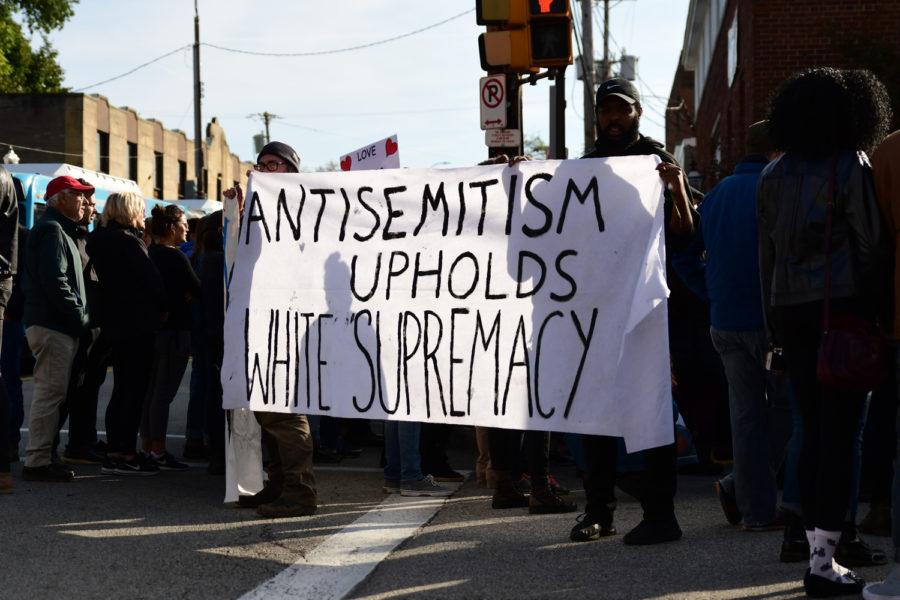Editorial: Focus on hate crimes, not Smollett
Bader Abdulmajeed | Staff Photographer
Demonstrators hold a sign in Squirrel Hill on Oct. 30, 2018, after the Tree of Life shooting.
February 27, 2019
After Jussie Smollett claimed he was attacked by white supremacists the night of Jan. 29, he is now facing charges for allegedly staging the attack himself. Some commentators like Tucker Carlson have seized onto these developments to bolster claims of widespread hate hoaxes while discrediting the occurrence of hate crimes.
But hate crimes in the United States are indisputably on the rise, and Smollett’s alleged hoax attack is far from representative of the real public safety threats posed by white supremacy and hatred. Regardless of this one incident, we have to pay more attention to dangers of hateful organizations and violent individuals, not on an alleged hoax.
A 49-year-old Coast Guard lieutenant was arrested Feb. 15 while studying killers like the Unabomber and the Virginia Tech gunman and plotting an attack that would spark a race war. Prosecutors say he stockpiled weapons, drew up a list of Democratic politicians to be killed and wished “to murder innocent civilians on a scale rarely seen in this country.”
The Naval Criminal Investigative Service opened an investigation this week into an infantry Marine over multiple tweets of Nazi propaganda and white supremacist imagery. One tweeted image depicted blocks of explosives arranged in the shape of a swastika.
The recent investigations into military personnel with ties to white supremacist organizations underscore FBI concerns over white supremacist infiltration of the armed forces. A 2018 ProPublica investigation into the violent neo-Nazi organization Atomwaffen revealed multiple members transferring skills learned in the U.S. military to other racist and violent members.
Since May 2017, three Atomwaffen members have been charged with five murders, including the death of Blaze Bernstein, a gay, Jewish college student whom authorities believe was stabbed more than 20 times.
The threat of hateful individuals willing to commit violent crimes extends beyond the armed forces. A 2018 FBI report on hate crimes revealed the number of hate crimes reported to the federal law enforcement agency had risen by 17 percent from 2016 to 2017. The report’s findings marked 2017 as the third year in a row that the number of hate crime incidents had grown.
But FBI statistics on hate crimes don’t even tell the fully story of hate crimes in America. A 2017 Bureau of Justice Statistics report suggested over half of hate crime victims never report the incidents to law enforcement.
In a statement to the BBC, Senior Counselor to the Attorney General Matthew Whitaker underscored the severity and violence posed by hate crimes.
“The Department of Justice’s top priority is to reduce violent crime in America, and hate crimes are violent crimes,” he said.
The risk to public safety posed by hate crimes has grown in the last three years and we must devote more attention than ever to confronting that threat. Despite Smollett’s hoax attack, we must remain credulous of possible hate crimes to stay proactive in countering these threats.
Treating reported hate crimes with skepticism only harms our ability to accurately assess and respond to real violent crimes that occur on a daily basis.
Law enforcement agencies in the United States reported 7,175 hate crimes in 2017. Smollett’s hoax attack makes these attacks no less real for their victims.








